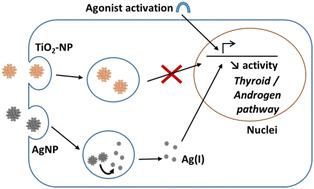当前位置:
X-MOL 学术
›
Environ. Sci.: Nano
›
论文详情
Our official English website, www.x-mol.net, welcomes your feedback! (Note: you will need to create a separate account there.)
The endocrine disruptor effect of metal nanoparticles mainly depends on their capacity to release metal ions
Environmental Science: Nano ( IF 5.8 ) Pub Date : 2024-06-07 , DOI: 10.1039/d4en00065j Peggy Charbonnier 1 , Pierre-Henri Jouneau 2 , Aurélien Deniaud 1
Environmental Science: Nano ( IF 5.8 ) Pub Date : 2024-06-07 , DOI: 10.1039/d4en00065j Peggy Charbonnier 1 , Pierre-Henri Jouneau 2 , Aurélien Deniaud 1
Affiliation

|
Throughout their lives, humans are constantly exposed to various pollutants that can affect our development and physiology. The growing list of pollutants include drugs, pesticides, cosmetics, plasticizers, and other organic molecules that have been found to disrupt endocrine activities. Endocrine disruptors can negatively impact our organism's development, metabolism, and sexual functions. Recently, it was discovered that exposure to silver nanoparticles (AgNP) inhibits specific liver nuclear receptors. Nuclear receptors are transcription factors that play a critical role in regulating important physiological functions including endocrine ones. To investigate further, we tested the impact of two types of metal nanoparticles: AgNP, which release metal ions, and titanium dioxide nanoparticles, which do not dissociate into ions. We found that AgNP significantly inhibited the thyroid and androgen pathways but had no effect on the aryl hydrocarbon pathway. On the other hand, titanium dioxide nanoparticles had little effect. Additionally, we observed that combining AgNP with antagonists led to cumulative inhibition of the thyroid and androgen pathways. Our previous data suggest that Ag(I) ions released from the NP trigger the inhibition of zinc finger-containing nuclear receptors. In conclusion, metal nanoparticles with a capacity to release metal ions are highly effective endocrine disruptors, and the impact caused by organic molecules co-transported with metal nanoparticles is minor.
中文翻译:

金属纳米粒子的内分泌干扰作用主要取决于其释放金属离子的能力
人类一生中不断接触各种污染物,这些污染物会影响我们的发育和生理机能。越来越多的污染物包括药物、杀虫剂、化妆品、增塑剂和其他被发现会扰乱内分泌活动的有机分子。内分泌干扰物会对我们机体的发育、新陈代谢和性功能产生负面影响。最近,人们发现接触银纳米颗粒(AgNP)会抑制特定的肝核受体。核受体是转录因子,在调节重要生理功能(包括内分泌功能)方面发挥着关键作用。为了进一步研究,我们测试了两种类型的金属纳米粒子的影响:释放金属离子的银纳米粒子和不解离成离子的二氧化钛纳米粒子。我们发现AgNP显着抑制甲状腺和雄激素途径,但对芳烃途径没有影响。另一方面,二氧化钛纳米颗粒的作用不大。此外,我们观察到,AgNP 与拮抗剂联合使用会导致甲状腺和雄激素途径的累积抑制。我们之前的数据表明,NP 释放的 Ag() 离子会触发含锌指核受体的抑制。总之,具有释放金属离子能力的金属纳米粒子是高效的内分泌干扰物,与金属纳米粒子共转运的有机分子造成的影响较小。
更新日期:2024-06-07
中文翻译:

金属纳米粒子的内分泌干扰作用主要取决于其释放金属离子的能力
人类一生中不断接触各种污染物,这些污染物会影响我们的发育和生理机能。越来越多的污染物包括药物、杀虫剂、化妆品、增塑剂和其他被发现会扰乱内分泌活动的有机分子。内分泌干扰物会对我们机体的发育、新陈代谢和性功能产生负面影响。最近,人们发现接触银纳米颗粒(AgNP)会抑制特定的肝核受体。核受体是转录因子,在调节重要生理功能(包括内分泌功能)方面发挥着关键作用。为了进一步研究,我们测试了两种类型的金属纳米粒子的影响:释放金属离子的银纳米粒子和不解离成离子的二氧化钛纳米粒子。我们发现AgNP显着抑制甲状腺和雄激素途径,但对芳烃途径没有影响。另一方面,二氧化钛纳米颗粒的作用不大。此外,我们观察到,AgNP 与拮抗剂联合使用会导致甲状腺和雄激素途径的累积抑制。我们之前的数据表明,NP 释放的 Ag() 离子会触发含锌指核受体的抑制。总之,具有释放金属离子能力的金属纳米粒子是高效的内分泌干扰物,与金属纳米粒子共转运的有机分子造成的影响较小。











































 京公网安备 11010802027423号
京公网安备 11010802027423号